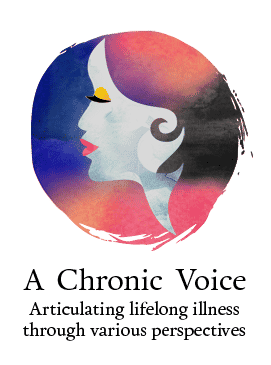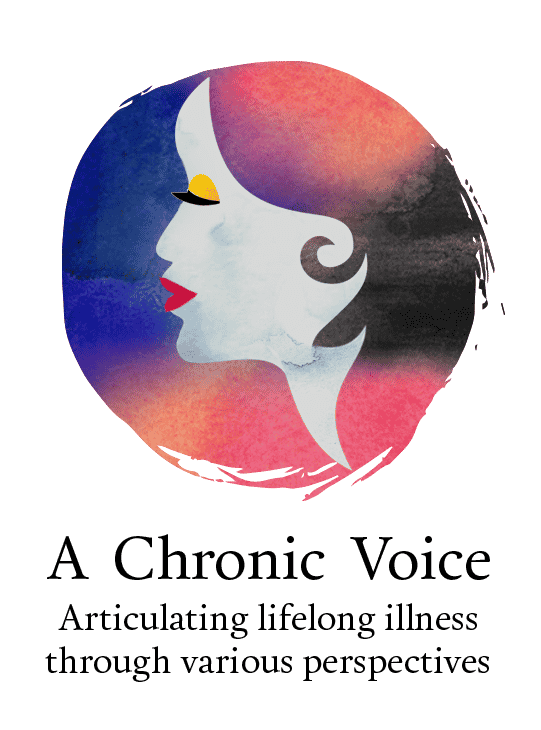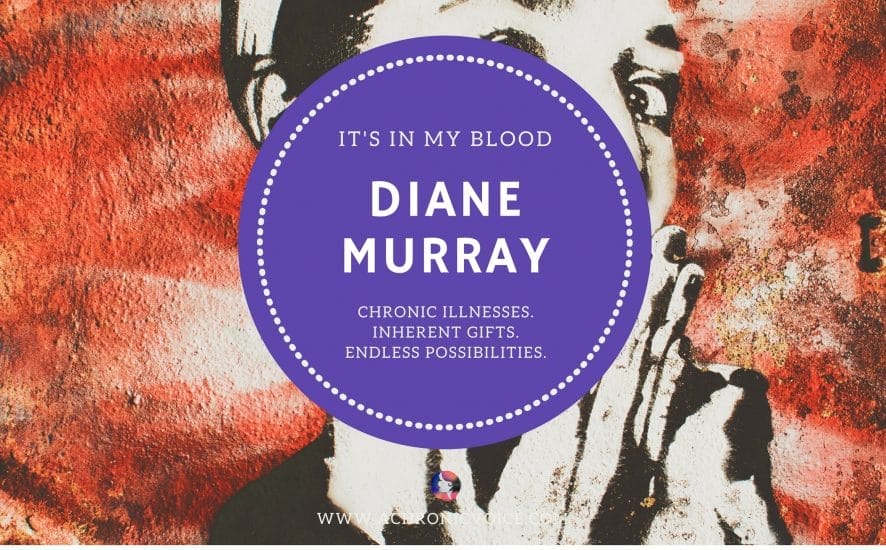Table of Contents
Featuring Diane Murray of “Spoonie Living”
Diane seems like someone who really knows how to make the best out of her life, and it was a pleasure working with her on this interview! She lives with a number of chronic and mental illnesses, but that hasn’t stopped her from picking up aikido and foreign languages. She also loves to cook (especially Italian!), advocate for various social causes, illustrate, and is very much into comics. Let’s check this spunky lady out!
*Want to be featured too? Click here to sign up!
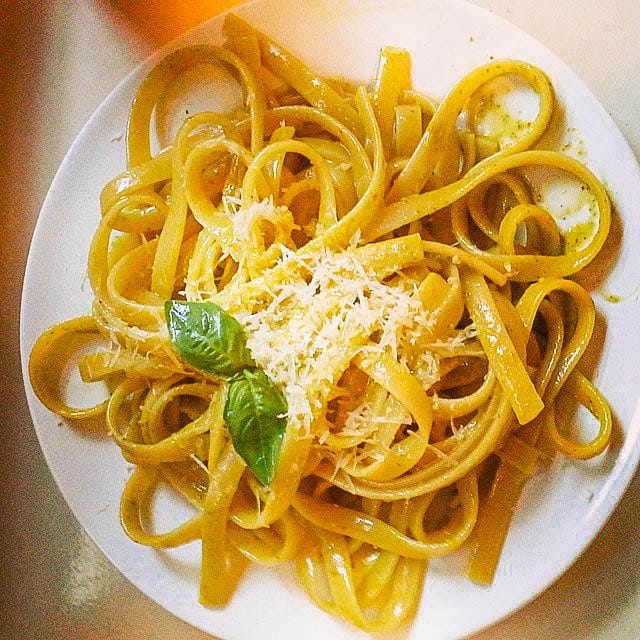
Fettuccine al limone pasta made by Diane
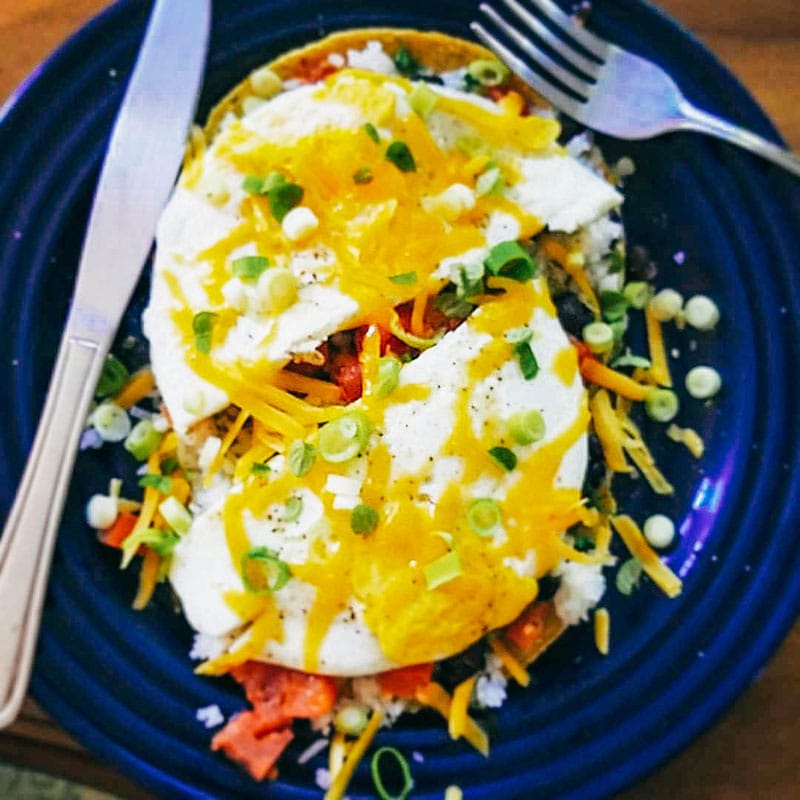
Huevos something eggs. Tortillas, parsley rice, black beans, tomatoes, salsa, eggies, cheese, scallions, and fresh oregano ?
ON COOKING
- How did this passion begin?
My folks are total food nerds and really impressed that on me as a kiddo, especially when it comes to Italian food. I was so proud of myself as a kid for being able to make simple things like pasta sauce, but things really kicked into gear when I studied abroad in Japan during my junior year of college.Not only was I surrounded by incredible, delicious food and new ingredients to work with, but it was the first time I was solely responsible for cooking for myself, and I enjoyed the heck out of it. This was before I got sick, too, so I had a lot more energy. I kept it up when I got back to the States and was living in on-campus apartments, and had a lot of fun, especially when we started splitting a CSA box.st
- What do you enjoy about cooking?
I love going all loosey-goosey with recipes, or going no-recipe and creating something new. I love getting fancy with interesting ingredients, and I love when a dish comes together. Right now I’m focusing on fine-tuning things—those small steps that make a big difference in flavor and quality. - Your best dish (according to others)?
Don’t have an answer for that! I cook so many different things and mostly for myself, so I don’t have folks saying “oh this is your best.” - Your favourite dish (according to you)?
Too many to count! A good carbonara, a well-herbed pork chop, Italian wedding soup, a perfect, simple, french omelette, or one of my mom’s comfort dishes. - Best drinks to pair these dishes with?
I mostly drink water! ? - Favourite meal of the day and why?
Every meal. Feed me please. - Do you mostly cook main dishes, or also enjoy making desserts, breakfast foods, etc?
Mostly main dishes; I don’t bake or anything so I don’t do a lot of desserts. - Favourite resources?
Bon Appetit! If you subscribe and read each issue, you slowly learn these little tips and tricks that really bring things together. - Chefs that inspire you?
My folks 🙂 I love Giada DeLaurentiis and Alton Brown, too. - Favourite and least favourite cuisines? Why?
Italian is my fave, naturally! It’s just perfect comfort food, and lots of carbs. Japanese, too (hey, carbs again!). Between their own dishes and the bizarre ways they make foreign dishes their own, I’m always in heaven. So much salt and umami! I’m not so into French though; it doesn’t have a lot to distinguish it, in my opinion. No strong or unique flavors. - Something you’d like to try out next?
Maybe a foray into baking… but I’m scared ? - Favourite cooking methods?
Throw it in a frying pan! Throw it in the oven! - A cooking method you find difficult to master and why?
Anything with exact ingredients or flour & eggs. I just don’t have the focus or patience for specific recipes. - Kitchen equipment you can’t live without?
Tongs and rice paddles. I can’t imagine a world without them. - Do you cook all your meals?
I’m responsible for most of my meals but I only really “cook” (that is, more than throwing some meat in a frying pan and turning on the rice cooker, etc.) occasionally due to fatigue. A lot of my meals are just assembled from leftovers. - Do you create any recipes from ‘scratch’? Would you like to share one, if so?
Sure! This is just a very, very simple dish, but I’ve added some flourishes that make it extra nice (it’s a good example of how the small things make a big difference). Rosemary lemon chicken with spaghetti. - Do you do any meal prepping or freezing? Any tips if so?
Yes, so much! Get a whole rotisserie chicken, pick it clean and tear into pieces, and freeze flat in a bag; if you have frozen peas on hand, you can reheat with rice and coconut oil or butter for a really decent, easy meal.
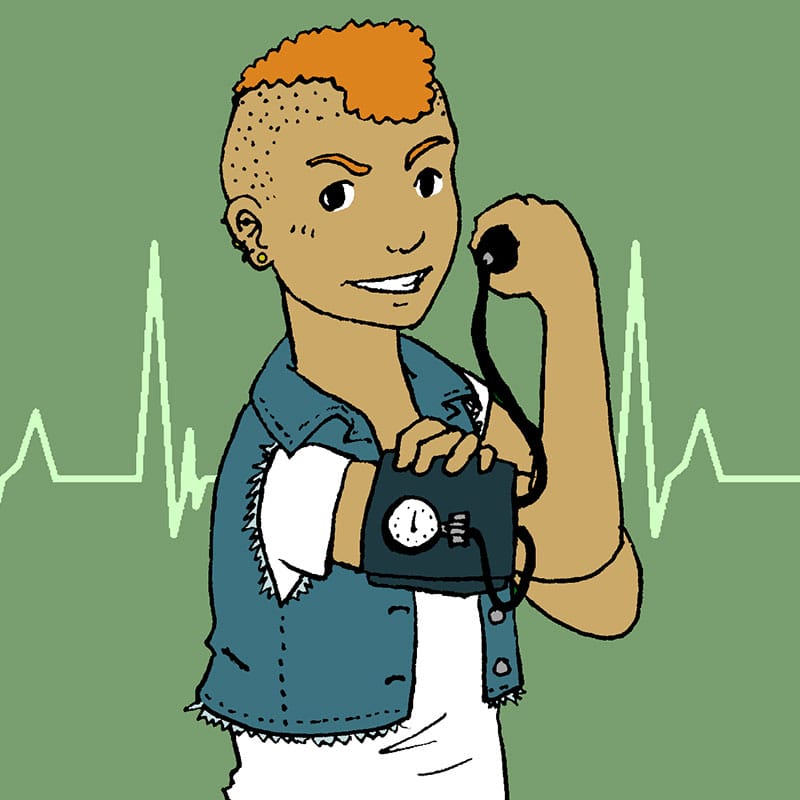
Diane’s cover art for Chronically Badass
ON ART, DESIGN & COMICS
- What sort of art/design do you do?
Kind of whatever is needed for my projects. I drew illustrations for Chronically Badass and do image manipulation for Spoonie Living. I used to be a much more prolific artist back in high school (I would go through a sketchbook a month!), but my inspiration really dropped off for one reason or another, and now I only use the skills as needed. - What’s your style like?
Somewhere between realism and cartoonish, for most of my illustrations. - What sort of mediums and tools do you use?
Pencil, inking pen, The G*MP (a Photoshop clone with an unfortunate name, as I use Linux), Inkscape (an Illustrator clone), and BeFunky for quick graphics for my blog. - What does art do for you?
Right now, it gets the job done and is a nice way to space out and flex my creative muscles. In high school, it was both a way to escape and also a way to connect with others. - How can it be used to help others or improve society?
Illustrations make things feel so much more friendly and accessible! They’re a universal language, and can help bridge gaps. - Favourite and least favourite art styles? Why?
I don’t… dislike any art styles, but I love the stuff we’re seeing out of American artists, especially independent ones, right now. - If you could go back in time to learn from one artist, who would that be? (Or if they’re still living, that’s okay too! ;))
I don’t have any specific thoughts on this one, but I’d love to be besties with Abby Howard. - Do you mostly draw by hand or use the computer or a mix of both?
I tend to sketch and sometimes do lineart by hand, then go digital for colors. - You mentioned a love for comics too. Do you also draw comics?
I wish! Maybe one day I can join some of my favorite artists, but for now I have too much on tap and no ideas. - Your top 3 recommended comics and briefly, why.
Actually doing four. Sorry not sorry.- Star Trip: A sci-fi webcomic about a 20-something human exploring the galaxy with a shapeshifter friend. Really beautiful art and worldbuilding, plus some nice gender and sexuality biz.
- O Human Star: A near-future webcomic about a dead man mysteriously resurrected, and the partner he left behind. Gay dads and trans robot clone daughter. Enough said.
- Paranatural: An urban fantasy webcomic about young schoolkids with magical ghost powers dealing with paranormal phenomena. Really fantastic concept and art, with the funniest writing and the best facial reactions.
- Transformers, especially More Than Meets The Eye (print comics): A little hard to get into, since recognizing robots and taking in the complex world building and franchise history is a challenge—but the art is great (especially Sara Pitre Durocher and Jack Lawrence), the plot very character-driven, and soooo many canonically gay robots.
ON FOREIGN LANGUAGES
- What languages do you speak?
French and Japanese. I learned French from middle school on (majored in Foreign Languages in college), and Japanese in college and a bit of customer service Japanese in a job after I graduated. I would say I speak fluently in both–that is, I can speak quickly and form grammatically complex sentences on the fly–but my vocabulary has really suffered since leaving school. - What new languages are you learning or going to learn?
None at the moment, but I’m interested in Russian, Spanish, Korean, and ASL. - What language do you speak in with your parents and grandparents?
Just English; the family is mostly American. My grandma was French, but I was young when she died and didn’t know French at that age. - Why are you interested in foreign languages?
They’re just… fun! It feels good to be able to communicate with more people and to learn to express yourself differently. It’s like knowing a secret code. - Most difficult thing for you in terms of learning a new language?
Vocabulary for sure. Memorization is hard. French is easier since some words are similar or related to English ones, but Japanese is a whole other world and takes way more work. - Most fun thing about it?
I adore learning new writing systems, again for the secret-code factor. When I was in high school I tried learning Hangul (Korean) and Cyrillic (Russian and a few other languages, I think?) for no reason other than to be a big nerd and be able to write stuff in code.When I took a semester of Russian in college, I got to learn Cyrillic cursive, which was the most fun, since it’s very different from print Cyrillic and, honestly, nigh incomprehensible (seriously, look it up). I feel so badass being able to write it. I love Japanese for the same reason, although the rote memorization can be rough.
- Tips for those who want to pick a new language up?
Honestly, language is one of those things that’s extremely hard to learn in a self-directed way; to really progress in language learning, you want to try to get into a class of some kind (especially the immersive kind where the teacher mostly uses the target language). This makes you practice with others, helps pace your learning, and serves as a motivating force. Of course, it’s possible to learn on your own, but I think it’s a little rarer to find success there. - Favourite resources?
I like WordReference for French (they have lots of other languages), and Tangorin for Japanese. Once you’re at the stage that you are trying to read articles or stories, I recommend a browser extension that gives you a lookup on any word you hover over; otherwise, looking up words in a dictionary kind of wrecks the flow of reading and makes it harder to comprehend. Rikaikun (Chrome) and Rikaichan (Firefox) are an absolutely must for Japanese. For non-web reading, a Kindle is well worth the investment. If you install a dictionary for your target language, you can do instant lookups while reading, too. - A rare language you’d think would be interesting to learn, regardless of usability?
Pretty much any rare or dying language I run across, to be honest! I often go down the wikipedia rabbit hole on these. I’m very curious about learning Japanese ASL after learning American ASL to see the differences, and it would be so fun to learn Haitian Creole — again, to see the differences and overlap with French. Creoles and pidgins are so cool. - What are your thoughts on the need for language preservation?
So worth it! If nothing else, do it for the cool factor. Languages are neat and we should keep records of them. - What do you think are the benefits of being bi/multilingual?
You can communicate with more people, which is always good. You have access to more ideas and materials, more culture and history. And it’s so good for the brain. - What do you think those who speak only one language are missing out on the most, if any?
The pride of knowing something complex that other people don’t! 🙂 - Sexiest language, in your opinion?
I think this one goes to Russian! I had TA with a decently deep voice and all I wanted to do was hear him saying vowels. Especially ы, which is weird since it’s the sort of sound you’d make out of disgust. I don’t understand it, but here we are. - Any dreams of becoming a foreign language teacher? Or do you already teach?
Not really, but I do like telling people about languages and linguistics. I get pretty excited over grammar and word histories. - How do you retain memory of a new language?
Aside from the usual flashcards and use in classes, I imagine conversations in my head, kind of like daydreaming. It’s a little silly, but I think it’s the key to my success in foreign languages. - Who do you practice the new language with?
Mostly classmates and teachers, in classes. I’m intensely shy about speaking someone’s native language with them unless I’m in their country. For some reason it feels like undue burden to ask them to be my practice buddy, even if it might be easier since it’s the one they’re most comfortable with. And I always feel weird starting conversations with my friends who speak the same language as me. It’s a pretty serious barrier.Right now I’m trying to speak French to my partner’s baby. Does that count? 🙂
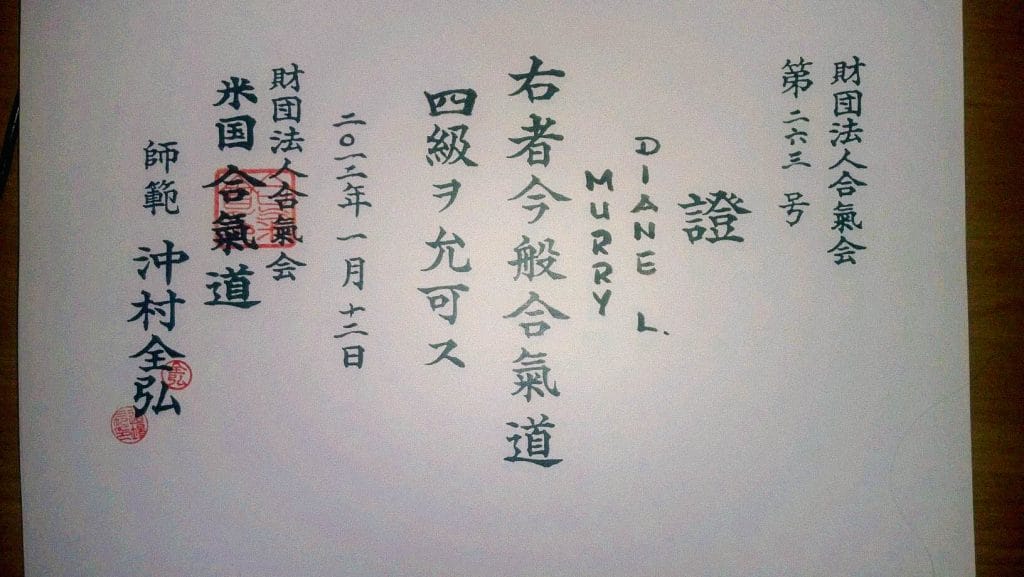
Diane’s 4th Kyu Japanese certificate in Aikido. Hard-earned for sure!
ON AIKIDO
- Of all martial arts, why did you pick aikido? Why do you like it best?
I’m a Quaker and wanted to find a martial art with nonviolent roots; Aikido is great because it is focused on accepting and rerouting a person’s energy. You barely learn to strike – and when you do, it’s only so you can be a decent training partner. There’s a lot of learning to protect yourself when thrown, and you also learn some really badass joint locks and throws.I also really appreciate the philosophical side. I’ve been really challenged mentally and emotionally, in addition to the usual physical challenge. It takes a LONG time to learn everything, because it requires such finesse. But it’s so rewarding when things finally start to fall into place.
- Who do you think will enjoy/benefit from aikido most?
A lot of people! It’s a very practical martial art, trains the spirit, and builds confidence. It can be practiced in many ways, too, and can be made accessible. It does not, however, give you benefits as immediately as other martial arts; it’s a frustrating slow burn and easy to give up on. - How often do you practice aikido?
I don’t, right now! When I got sick I had to stop practicing. In the future I would like to join a local Ki class, which is focused more on mind-body connection and is less physically demanding. - Do you go somewhere to learn? How often and what’s it like practicing in a group class?
Yes, definitely. Most Aikido training is in pairs, since it’s all about a meeting of energies. I used to go once or twice a week. It’s scary and humbling and brutal, but it sure feels good. - Apart from the physical, are there any important mental or psychological aspects to it?
Yes! The philosophy of accepting and redirecting energies is an important part of learning properly, as you have to be in that mindspace to do it right. You can’t force it. It takes so long to learn anything that you have to learn patience and make peace with failure.There was actually a concept that kind of changed my life: “irimi,” which in this context means “entering.” The way our Sensei taught it, irimi was saying hello and going to shaking someone’s hand, even when they were coming at you. It was about accepting the energy rather than running away, and that really spoke to me as a person with a lot of social anxiety. I made it my goal to practice irimi in my life, and several years later, I feel much more at home and confident in myself and around others, not to mention in my choices.
- Are there any ‘belt levels’ in aikido, and if so, which are you currently at?
Aikido generally doesn’t do color belts (except for kiddos), but there is a level where you transition from white belt to a black belt and a Hakama (black or dark blue pants that go over the standard gi). Without going into the terminology, which is all Japanese, the ranking for white belt goes 5, 4, 3, 2, 1, and then black belt counts up again. Don’t ask me why. I am at white belt 4, which has taken a LOT of time and work. I practiced for about 4 years and was starting to get serious about preparing for the 3 test before I got sick. - Any aspirations to teach in future, or is this purely for fun?
Nah, not teaching. I just want to get better. I really aspire to reach the black belt ranking. Actually, I have a fantasy of living and training at the home dojo in Japan, which is a thing you can do! - The parts of your body that get worked out the most in aikido?
Everything! It it such a full-body exercise. Some techniques are done from the floor, kneeling, and you kneel during demonstrations and while the sensei is talking, so I suppose your legs get a good workout. And your abs, from jumping back up when you get thrown down (which is literally every 15 seconds of practice). - When the going gets tough during practice, how do you keep yourself going?
Honestly, the only thing that keeps me from tapping out is the intense structural/social/etiquette pressure and class expectations. You do NOT leave the mat unless you’re dying. I’ve asked to leave and get water and been told no several times. That external discipline keeps you going when you want to give up. - Any tips for those who are thinking of picking up some form of martial arts?
Find one that frustrates the everloving hell out of you. You will find so much growth in it. And find one with connections to the originating country, at the very least, and make sure you’re getting a good and legitimate education.
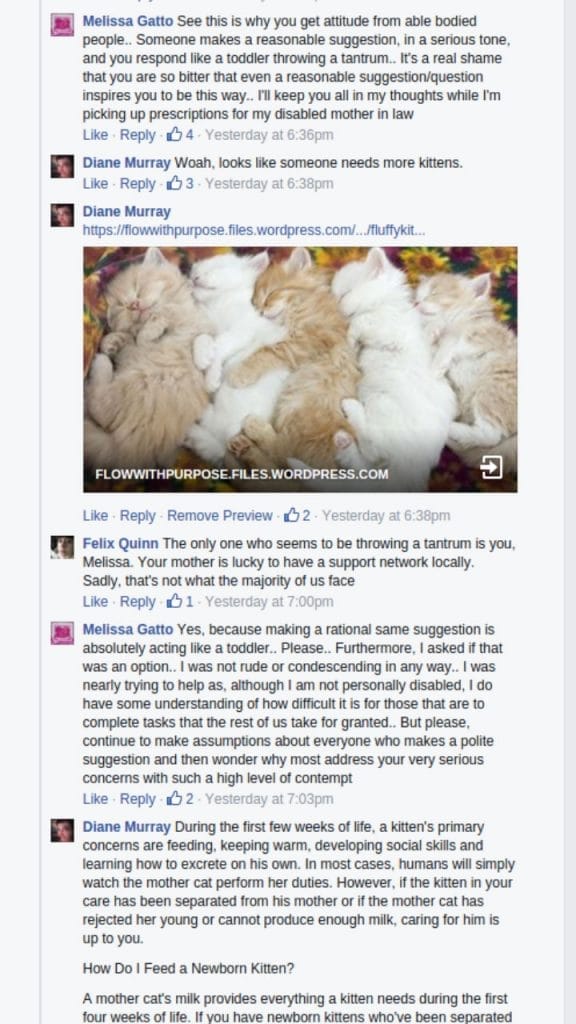
Diane doesn’t always troll, but when she does it’s cute and fluffy
ON ACTIVISM
- What sort of activism work do you do?
A lot of stuff in the social justice realm, especially LGBTQ, healthcare, sexuality, and disability. I often read and boost stuff on race, too, although I have almost no connection to that except as an observer. - Why do you think this is important?
Social issues are…well, social issues! As social beings, they’re really the core of our experience. And marginalization can really ruin that experience and have a huge negative impact on quality of life. - How do you think others will benefit from it, both the people you are advocating for, and whom you are advocating to?
For the stuff I do, it’s all about awareness, empathy, and understanding on the part of folks outside the group, and resources, validation and lifting up voices of folks on the inside. - Best feeling you get from it?
When folks tell me they’ve learned something or feel supported! When a hardliner gets their opinion changed because of what I said or wrote. - Hardest parts about activism work?
Figuring out the most effective way to communicate; it’s so variable by individual and takes so much thought! It’s also hard to empathize with those nasty, hateful people, and the folks who are just so self-focused that they’ve never thought about what it’s like to be in someone else’s shoes. Sometimes I just get mad and have to walk away. - What do you do when you encounter someone rude, ignorant or hostile?
It depends. I try to engage kindly at first, but as the conversation wears on I make a call on whether it’s going to be productive and either keep going at it or just tell them they’re a jerk, so that they get the feedback that their behavior is unacceptable, and move on. One time I ended up in a horribly ableist thread on Facebook, and decided these folks were absolutely not worth engaging with and started trolling them by sending pictures of kittens and cat facts in response to every rude comment they made. That was intensely satisfying and ensured they didn’t get away with being awful to others in the thread, in a way that didn’t continue the conversation. - What motivates you to keep working at it?
The absolute, dire need for social justice in this world. Things are just so bad and I feel a responsibility to do everything I can to protect others.
*All images here used with permission from Diane Murray. Want to be featured too? Click here to sign up! You can also read more interviews on that page 🙂
If you liked this article, sign up for our mailing list here so you don’t miss out on our latest posts!
Diane Lives with the Following Illnesses:
- Undiagnosed EDS-H
- POTS
- Cyclothymia (bipolar)
- Anxiety
- SIBO
- And a few other things that haven’t quite coalesced into a pattern yet
Learn more about her experiences living with them on her blog.
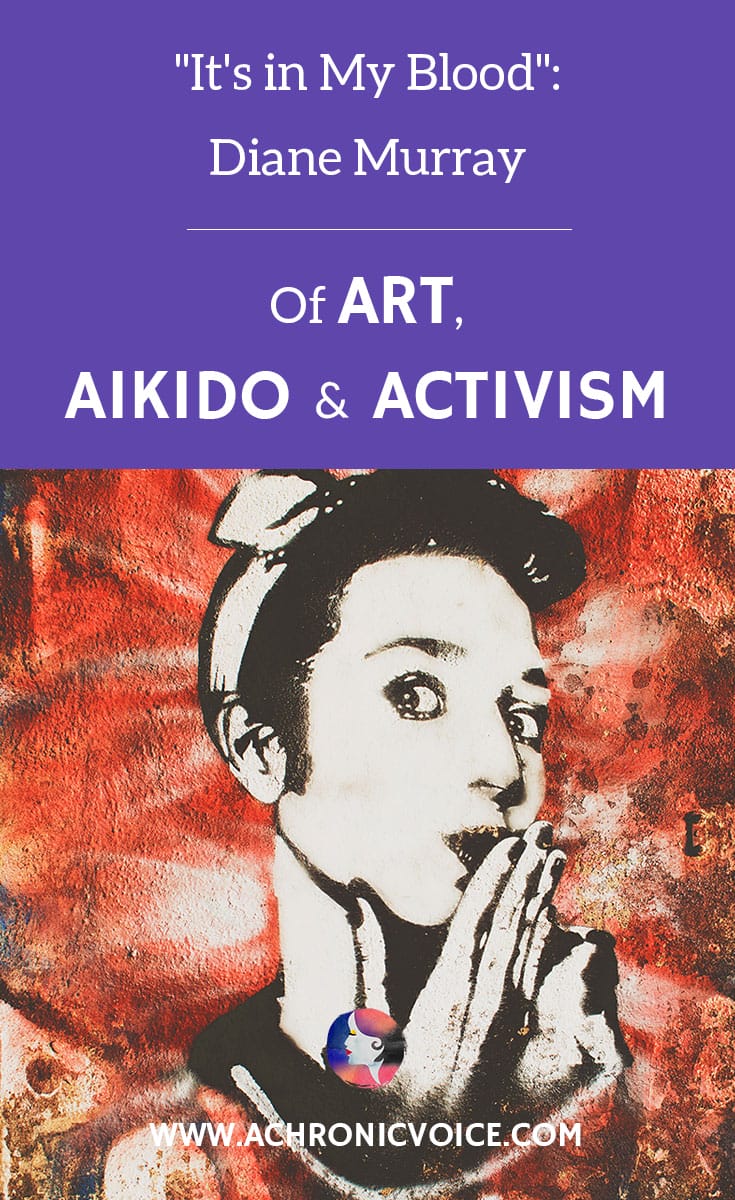
Contributor Bio
